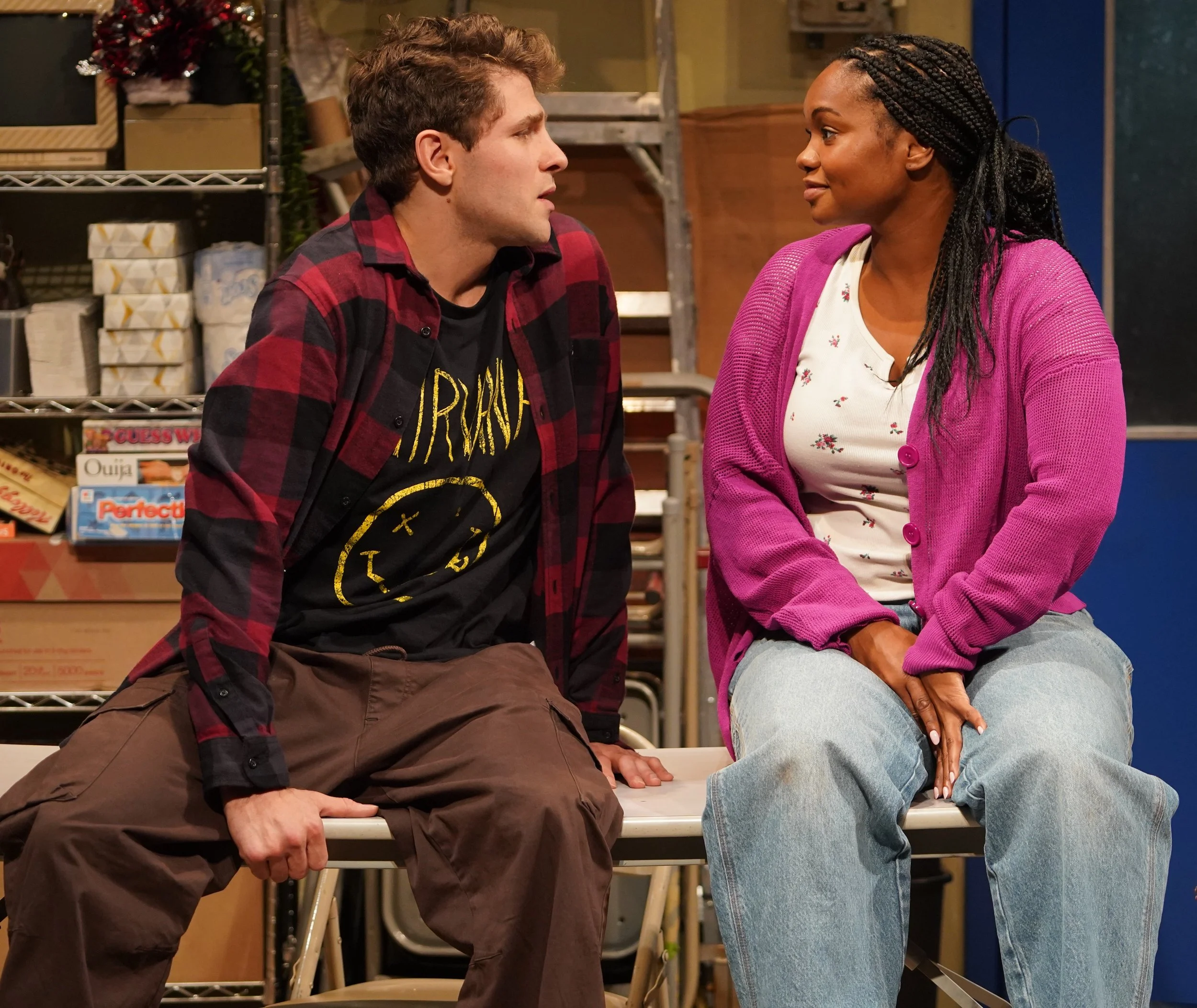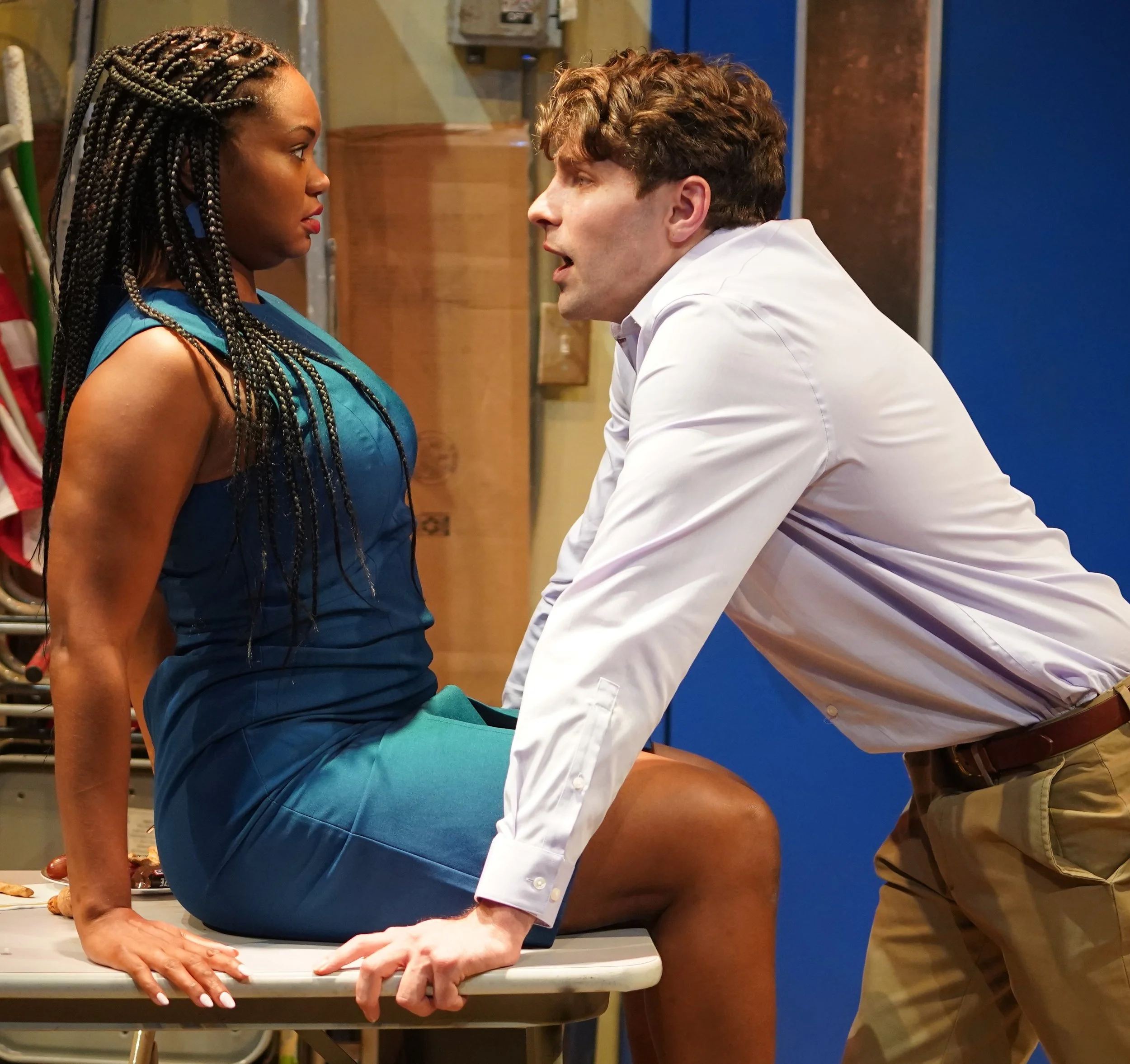Opposites attract…maybe: David Garelik and Malika Samuel as Nathan and Melody in Bite Me.
Eliana Pipes’ Bite Me—a 90-minute drama having its world premiere in a coproduction by WP Theater and Colt Coeur—has an ABC Afterschool Special vibe. It’s about high schoolers in distress, but is not harsh and graphic like much of today's teen fare; its gentleness is more in line with the ’70s-era standards of those Afterschool Specials, minus the sappiness and didacticism.
Garelik as Nathan, a high school senior in 2004. Photographs by Carol Rosegg.
The play’s two characters, Melody and Nathan, are high school classmates who become friends through spending time together in a storage room that neither is supposed to be in. Melody, as student-body treasurer, has the key; Nathan just jimmies his way in with a pocketknife. The first time they discover each other in the room, both are hiding—she from some mean girls who might see her crying, he from the guidance counselor whose property he stole.
Melody is African American, a commuting nonresident of the “good” district—that’s the wording in the program—where their school is located. She’s supersmart and diligent, but a lonely outcast. Nathan, a white boy who lives with distant parents and a druggie older brother, pays Melody to do his homework. Besides being a petty thief, Nathan sells drugs. And abuses them, too, to go along with his burgeoning alcoholism. Even as he grows closer to Melody, he refuses to open up to her about his troubles—and, much to her disappointment, also refuses to acknowledge that they have grown closer.
While Melody lets out a few primal screams, the play never gets histrionic or mean-spirited. It’s an empathetic story about surviving adolescent travails and discovering another way forward that you hadn’t considered before. Actors Malika Samuel and David Garelik are totally believable as high schoolers (they play closer to their real ages in the last scene, which takes place at the 10-year class reunion), and their comfort in the roles makes it a pleasure to watch the characters’ broom-closet rendezvous. Pipes’ dialogue is realistic as well, and her script captures not only teenagers’ speech patterns but also their mixed emotions and reluctance, or inability, to articulate them.
In Samuel’s deftly shaded performance, Melody both lights up with affection and feels stifled expressing it. The actress takes her on a palpable emotional journey: developing a crush on Nathan and enjoying the new side of herself he helps bring out, yet being hurt by his indifference. Garelik, too, performs a fine balancing act, allowing Nathan to be likable despite his casual cruelty to Melody and general misdeeds.
Samuel and Garelik as Mel (no longer Melody) and Nathan at their class reunion.
Chika Shimizu’s set is another standout in Bite Me: a grimy room full of miscellaneous junk, from buckets, bowls and boxes to Christmas decorations and theater costumes to board games, reams of paper and old computers. And they’re all placed in a way that looks like people just quickly dropped them off or stuffed them into whatever space was available. Outside of the storage room, the far sides of the stage depict other places in a high school: lockers, a bulletin board, an institution-style bathroom.
What’s missing from Bite Me is, ironically, bite (and a more suitable title). This is especially lacking when it comes to the racial aspect. It’s not even clear that Melody’s insecurities and the popular girls’ insults have to do with her race rather than other things teens typically get picked on for. Not until the reunion scene does she explicitly state, “I was the only Black girl at this school, and I was so alone” and Nathan acknowledges it was a “school of rich white assholes.”
In the earlier scenes, the dialogue around race is more oblique. Melody takes offense when Nathan says smoking weed will “be more your style” than regular cigarettes, and when she talks about her old classmates (“like, six of those girls got pregnant last year. ... I promised myself I’d keep in touch with those girls, but now there’s just nothing left to say”) and Nathan remarks, “Who cares about those girls? You’re not like them,” she forcefully responds, “Yes, I am. I’m exactly like them.” Because these references are so brief, the issue doesn’t have much impact on the relationship.
Bite Me’s story in general proceeds somewhat uneventfully, even though Nathan’s home life and self-destructive acts, as well as the racial factor, hint at a calamity that could ensue. And the reunion doesn’t bring any devastating reveals or shocks. Perhaps I’d been conditioned by too many Neil LaBute plays to expect the worst from a scene in which a man and a woman meet up for the first time since he shot down her advances, but Bite Me doesn’t resort to any LaBute-ish nasty gamesmanship or revenge. It takes a more life-affirming tack, and that turns out be one of its strengths.
Bite Me runs through Oct. 22 at WP Theater (2162 Broadway). Evening performances are at 7 p.m. Tuesday through Friday and at 8 p.m. Saturday; matinees are at 3 p.m. Sunday and 1 p.m. Friday; wptheater.org.
Playwright: Eliana Pipes
Director: Rebecca Martínez
Sets: Chika Shimizu
Costumes: Sarita Fellows
Lighting: Lucrecia Briceño
Sound: Tosin Olufolabi





